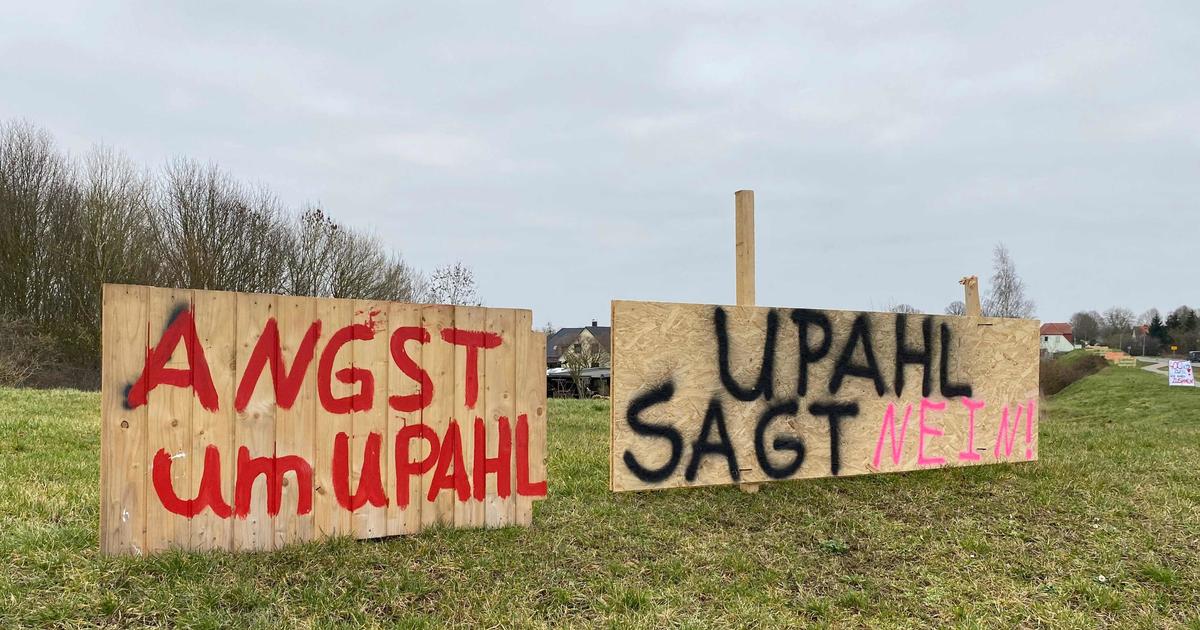“
Upahl says no
”, “
think of our children!
»: along the road leading to this small village in northern Germany, it is difficult to ignore the wooden signs whose large, brightly colored letters stand out against the gray sky.
For weeks, the town of some 500 inhabitants has been up against a project to set up an accommodation center for asylum seekers that can accommodate up to 400 people in containers.
Migration pressure
As elsewhere in Germany, this rural district of Mecklenburg, the region where Upahl is located, is struggling to cope with the influx of refugees.
Last year, 217,774 asylum applications were filed in Germany, more than double the total for 2020, according to official data.
This is the highest number since the great migration crisis of the years 2015/16 when Syrians and Afghans fleeing war or persecution found refuge in Europe's leading economy.
Last year too, they came mainly from Syria where the war continues, followed by Afghanistan now in the hands of the Taliban, Turkey or Iraq.
Read alsoMigrants: Europe wants to strengthen its borders
And since the start of the Russian invasion on February 24, 2022, more than a million Ukrainians have arrived in Germany.
Even if they do not need to apply for asylum, their care increases the pressure on local communities.
“
We have a situation that we can no longer cope with, like many other cantons and municipalities in Germany
,” Tino Schomann, administrative manager of the North-West Mecklenburg district, told AFP, where gymnasiums have been requisitioned for receive asylum seekers.
fear for safety
Retired lorry driver Bernd Wien, 66, who has lived in Upahl since 1980, is on the front line of protests against the center which is due to open in March.
“
We just want to live quietly here, enjoy our retirement
,” he says.
"
We have no barriers, no gate, we can ring the doorbell of others if we need something
", testifies Jan Achilles, 46 years old and member of the municipal council.
The refugee center will change everything, predicts this environmental analyst.
When hundreds of "
people, refugees or Germans or others, are crowded together in one place, it creates problems
", he says.
After months of calls for help from local officials, Interior Minister Nancy Faeser is organizing a meeting of municipalities, regions and the government on Thursday, which must provide "a
common humanitarian effort
", according to her.
She wants to improve the distribution of reception: "
Some communities can no longer, other municipalities clearly still have free places
", she observed.
Read alsoGermany: in Neukölln, residents tempted by the far right
The office of Anika Reisch, a 38-year-old insurance agent, borders the land where bulldozers are already preparing the installation of containers, in Upahl.
This mother of two says she is full of empathy for the future occupants “
who are traumatized, who are worried about the future
”.
But she is against their installation in a structure where “
they have no intimacy, where they cannot (...) face all that they lived.
It can't be good for anyone
."
Limit the influx
The great migration crisis of 2015 marked the rise of the far-right Alternative for Germany (AfD) party.
With its aggressive anti-migrant campaign, the party succeeded two years later in making a sensational entry into parliament.
In Upahl, far-right activists infiltrated protesters, fueling fears that the current crisis could once again benefit the AfD.
"
The general situation is ultimately much more dramatic than in 2015 because of the war, inflation, economic crises and new refugees
," said Hajo Funke, a political scientist at the University. free from Berlin.
Reinhard Sager, president of the association of German districts, asks for more firmness from the government which "
must immediately limit the influx
" of asylum seekers while "
Europe's external borders must be protected and deportations significantly increased
“, he listed in January.
With reception capacities exhausted in his region and between 20 and 30 new arrivals per week, Tino Schomann, the district manager, sees no alternative to the Upahl center: "I need more
space
" , he said.

